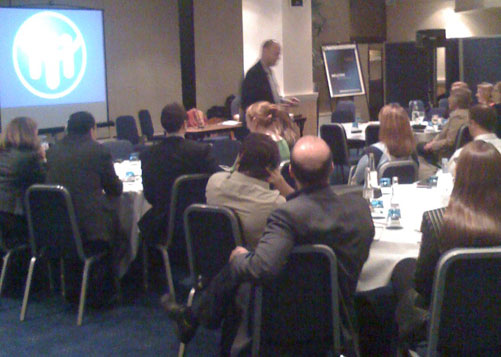|
MORE DETAILS
|
EVENING BRIEFING - 5 NOV 2008 - WEST LONDON
|
CME - what's happening out there?
Lawrence Sherman led an excellent discussion about CME. A short overview including key points from his presentation are published here below.
To make sure you're included in announcements about future events just email Peter Llewellyn, if you haven't already done so, to register your interest.

Report written by Sara Freeman, MedWriter
Following on from the highly successful European CME Forum held at the Novotel in West London on November 4–5, this evening briefing provided the opportunity to question US expert Lawrence Sherman (FACME, CCMEP) about the current state of CME in the USA. Sherman is President and CEO of the New York-based Physician’s Academy for Clinical Management and Excellence and has over 15 years’ experience in delivering high-quality, independent, continuing medical education (CME) programmes to the medical profession.
Also on hand at this informal event were several European CME experts and delegates from the preceding two-day European CME Forum to give their views on how CME is changing outside of the USA. Audience members included Eugene Pozniak, the Managing Director of Siyemi Learning and Programme Director of the European CME Forum.
In contrast to Europe, Sherman noted that agencies in the USA have to choose one of two paths – either they provide independent CME programmes or they provide medical education services. The two cannot mix.
The first, perhaps most important, step in any good CME programme is to conduct a needs analysis. This can help ensure that the content is not only of interest and is clinically relevant, but also that it has the potential to change physician behaviour, improve professional knowledge and/or competence, and ultimately result in improved patient outcomes.
On the other hand, signs of a bad CME program are: no needs assessment, not being evidence-based or having a product-driven curriculum, a dull or inappropriate use of medium, venue, or delivery channel, and not having a suitable outcome measure in mind. Choosing an inappropriate faculty or inadequate speakers also does not help. “Sometimes the person with the best CV is the worst presenter,” said Sherman.
Some of the other interesting points that were raised during the evening session included:
CME outcomes are easier to measure than you might imagine – clear objectives on what the CME programme is trying to achieve must be set from the outset. “You can only measure what you state you are trying to do,” Sherman advised.
Pre-and post assessment of the CME activity will be necessary and the timing of the latter assessment (e.g. immediate or weeks/months later) will depend on what you set out to achieve.
A common mistake made when creating CME programmes is forgetting that people have different learning styles and what suits one physician may not suit another (e.g. web-based learning may be better for some, while others may prefer participation in a workshop or accredited symposium). In addition, knowing your audience is critical to the success of any CME programme.
No matter how effective you think your CME activity is, physicians may not be willing to change practice or act on knowledge gained until they see a change in the relevant guidelines or confirmation from the thought leaders of professional societies in their field.
In the future, CME is likely to move away from sponsorship from the Pharmaceutical industry.
These were just a few of the many interesting points made during the evening. It was clear that CME has greatly improved in the USA in recent years. Things may also be on the up in Europe, but there is still long way to go.
Lawrence is happy to be contacted if you have any questions, on email LS@physiciansacademy.com.
|
|
|

